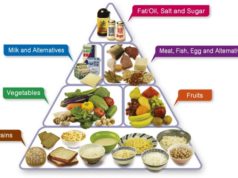How to add magnesium to diet – How to add magnesium to your diet sets the stage for a journey toward a healthier you. Magnesium, an essential mineral, plays a crucial role in countless bodily functions, from muscle and nerve function to blood sugar control and energy production. A deficiency in this vital nutrient can lead to a range of health issues, highlighting the importance of ensuring adequate magnesium intake.
This guide explores the diverse ways to increase your magnesium levels, from incorporating magnesium-rich foods into your daily meals to understanding the benefits and considerations of magnesium supplements. We’ll delve into the factors that influence magnesium absorption, potential side effects, and the importance of consulting a healthcare professional for personalized advice.
Understanding Magnesium’s Importance
Magnesium is a vital mineral that plays a crucial role in over 300 biochemical reactions within the body. It is essential for maintaining overall health and well-being, influencing various bodily functions, from muscle and nerve function to energy production and blood sugar regulation.
Benefits of Adequate Magnesium Intake
Adequate magnesium intake offers a wide range of health benefits. Here are some key advantages:
- Supports Muscle and Nerve Function: Magnesium contributes to proper nerve function by influencing the transmission of nerve impulses, and it aids in muscle contraction and relaxation. A sufficient intake can help prevent muscle cramps and spasms, promoting smooth muscle movement.
- Boosts Energy Production: Magnesium is essential for the production of adenosine triphosphate (ATP), the body’s primary energy source. By participating in energy metabolism, magnesium ensures that cells have the energy needed for various functions, including muscle contraction, nerve impulses, and protein synthesis.
- Regulates Blood Sugar Levels: Magnesium plays a role in insulin sensitivity, helping to regulate blood sugar levels. It contributes to glucose metabolism and helps the body use glucose effectively, which is crucial for maintaining healthy blood sugar levels.
- Promotes Bone Health: Magnesium is vital for bone formation and maintenance. It helps regulate calcium absorption and deposition in bones, contributing to bone density and strength.
- Supports Cardiovascular Health: Magnesium helps maintain a healthy heart rhythm and blood pressure. It contributes to blood vessel dilation, reducing the risk of blood clots and improving blood flow.
- Reduces Inflammation: Magnesium has anti-inflammatory properties that can help reduce inflammation throughout the body, potentially contributing to a lower risk of chronic diseases.
- Enhances Sleep Quality: Magnesium plays a role in regulating sleep cycles and promoting relaxation. It can help improve sleep quality and reduce insomnia.
Potential Health Issues Related to Magnesium Deficiency
Magnesium deficiency, also known as hypomagnesemia, can lead to various health problems. Here are some potential issues associated with inadequate magnesium intake:
- Muscle Cramps and Spasms: Insufficient magnesium can disrupt muscle function, leading to cramps, spasms, and weakness. These symptoms can affect various muscle groups, including legs, arms, and even the heart.
- Fatigue and Weakness: Magnesium deficiency can cause fatigue, weakness, and lethargy due to its role in energy production. The body may struggle to generate enough energy to support daily activities, leading to a feeling of exhaustion.
- Headaches and Migraines: Some individuals experience headaches or migraines as a symptom of magnesium deficiency. Magnesium may help regulate blood flow and nerve function, which can contribute to headache relief.
- Anxiety and Depression: Research suggests that magnesium deficiency may be linked to anxiety and depression. Magnesium plays a role in neurotransmitter function, which is crucial for mood regulation.
- Increased Risk of Chronic Diseases: Magnesium deficiency has been associated with an increased risk of various chronic diseases, including heart disease, type 2 diabetes, and osteoporosis. This is because magnesium plays a role in several processes related to these conditions.
Dietary Sources of Magnesium
Getting enough magnesium through your diet is essential for overall health. By incorporating magnesium-rich foods into your meals and snacks, you can naturally increase your intake and reap the benefits of this vital mineral.
Foods Rich in Magnesium
Magnesium is found in a wide variety of foods, making it relatively easy to get enough through your diet. Here’s a breakdown of some excellent sources, categorized by food group:
| Food Group | Foods | Approximate Magnesium Content (mg per serving) |
|---|---|---|
| Vegetables | Spinach, Swiss chard, kale, avocado, broccoli, edamame | 150-200 mg per 1 cup cooked |
| Fruits | Bananas, blackberries, raspberries, avocado, dried apricots | 30-50 mg per 1 cup |
| Nuts and Seeds | Almonds, cashews, pumpkin seeds, sunflower seeds, chia seeds | 80-160 mg per 1/4 cup |
| Grains | Brown rice, quinoa, oats, whole wheat bread | 50-80 mg per 1 cup cooked |
| Legumes | Black beans, kidney beans, chickpeas, lentils | 60-80 mg per 1/2 cup cooked |
| Other | Dark chocolate (70% cocoa or higher), tofu, yogurt | 50-100 mg per serving |
Tips for Incorporating Magnesium-Rich Foods
Here are some practical tips for increasing your magnesium intake through diet:
- Add leafy greens to your meals: Include spinach, kale, or Swiss chard in salads, smoothies, or stir-fries.
- Snack on nuts and seeds: Keep a handful of almonds, cashews, or pumpkin seeds handy for a nutritious and magnesium-rich snack.
- Choose whole grains: Opt for brown rice, quinoa, or whole wheat bread over refined grains.
- Include legumes in your diet: Add black beans, chickpeas, or lentils to soups, stews, or salads.
- Enjoy dark chocolate: Indulge in a small piece of dark chocolate (70% cocoa or higher) as a treat.
Recipe Examples
Here are a few recipe examples that showcase magnesium-rich ingredients:
- Spinach and Feta Salad: This salad combines leafy green spinach with salty feta cheese, juicy tomatoes, and a light vinaigrette. It’s a delicious and nutritious way to enjoy a magnesium-rich meal.
- Quinoa and Black Bean Bowl: This hearty bowl features quinoa, black beans, roasted sweet potatoes, and avocado. It’s packed with protein, fiber, and magnesium, making it a satisfying and healthy meal option.
- Trail Mix: Combine your favorite nuts, seeds, and dried fruit for a portable and energy-boosting snack. This mix is rich in magnesium, protein, and healthy fats.
Magnesium Supplements

If you’re struggling to meet your daily magnesium needs through diet alone, supplements can be a helpful option. Magnesium supplements come in various forms, each with its own pros and cons. Choosing the right supplement depends on your individual needs and preferences.
Types of Magnesium Supplements
Magnesium supplements are available in different forms, each with unique characteristics and absorption rates.
- Magnesium Citrate: This form is highly bioavailable and often used for constipation relief. It’s generally well-tolerated, but can cause digestive upset in some individuals.
- Magnesium Glycinate: This is a gentle form of magnesium, making it a good choice for those with sensitive stomachs. It’s also known for its calming effects and may improve sleep quality.
- Magnesium Oxide: This is a cost-effective option, but its absorption rate is relatively low. It’s often used for treating heartburn and indigestion.
- Magnesium Chloride: This form is absorbed well and can be found in various forms, including sprays, oils, and bath salts. It’s often used for muscle cramps and pain relief.
- Magnesium Sulfate (Epsom Salt): This form is commonly used in bath salts for muscle relaxation and detoxification. It’s also available as a supplement, but its absorption rate is lower than other forms.
- Magnesium Threonate: This form is specifically designed to cross the blood-brain barrier, potentially improving brain function and cognitive health.
Factors Influencing Magnesium Absorption
Your body’s ability to absorb magnesium from food and supplements can be influenced by various factors, including your age, gender, health conditions, and dietary habits. Understanding these factors can help you optimize your magnesium intake and ensure your body gets the nutrients it needs.
Age and Gender
As you age, your body’s ability to absorb magnesium may decrease. This is partly due to changes in gut health and reduced digestive function. Older adults may also be at increased risk of magnesium deficiency due to factors such as medications, chronic diseases, and reduced dietary intake.
Women, particularly those of reproductive age, have higher magnesium requirements due to menstrual cycles and pregnancy. During pregnancy, the body’s demand for magnesium increases significantly to support fetal growth and development.
Health Conditions
Certain health conditions can interfere with magnesium absorption. For example, individuals with gastrointestinal disorders like Crohn’s disease or celiac disease may have difficulty absorbing nutrients, including magnesium.
Chronic kidney disease can also impair magnesium absorption, leading to increased risk of deficiency.
Diabetes, particularly type 2 diabetes, can affect magnesium levels due to increased urinary excretion and reduced absorption.
Vitamin D and Calcium
While not directly involved in magnesium absorption, vitamin D and calcium play indirect roles.
Vitamin D promotes calcium absorption, which in turn can enhance magnesium absorption.
However, excessive calcium intake can compete with magnesium for absorption, potentially leading to lower magnesium levels.
Tips for Maximizing Magnesium Absorption, How to add magnesium to diet
- Choose magnesium-rich foods: Prioritize whole grains, leafy green vegetables, nuts, seeds, and legumes in your diet.
- Combine magnesium with vitamin D-rich foods: Include foods like fatty fish, eggs, and fortified milk in your diet to enhance magnesium absorption.
- Limit excessive calcium intake: While calcium is essential, consuming excessive amounts can interfere with magnesium absorption. Aim for a balanced intake of both minerals.
- Consider magnesium supplements: If you have difficulty meeting your magnesium needs through diet alone, consider talking to your doctor about taking a supplement. Magnesium supplements are available in various forms, including magnesium citrate, glycinate, and oxide. It’s important to choose a supplement that’s right for you and to take it as directed.
Potential Side Effects and Interactions
While magnesium is generally safe for most people, excessive intake can lead to side effects, and it can interact with certain medications. Understanding these potential issues can help you safely incorporate magnesium into your diet.
Potential Side Effects of Excessive Magnesium Intake
High doses of magnesium can cause gastrointestinal issues like diarrhea, nausea, and abdominal cramps. In rare cases, excessive magnesium intake can lead to more serious side effects, such as low blood pressure, muscle weakness, and irregular heartbeat.
Interactions with Medications and Supplements
Magnesium can interact with certain medications and supplements. It’s crucial to consult with your healthcare provider before taking magnesium supplements, especially if you’re taking any of the following:
- Antibiotics: Magnesium can interfere with the absorption of some antibiotics.
- Diuretics: Diuretics can increase the risk of magnesium deficiency, and taking magnesium supplements while on diuretics may not be recommended.
- Calcium channel blockers: These medications are used to treat high blood pressure and heart conditions. Taking magnesium supplements with calcium channel blockers may increase the risk of side effects.
- Iron supplements: Magnesium can interfere with iron absorption.
Minimizing Potential Side Effects and Interactions
To minimize the risk of side effects and interactions:
- Start with a low dose: Begin with a low dose of magnesium supplements and gradually increase it as needed, monitoring for any side effects.
- Take magnesium with food: Taking magnesium with food can help reduce the risk of gastrointestinal side effects.
- Consult your doctor: If you have any underlying medical conditions or are taking medications, talk to your doctor before taking magnesium supplements.
- Pay attention to your body: Be aware of any changes in your health or symptoms and report them to your healthcare provider.
Consulting a Healthcare Professional: How To Add Magnesium To Diet
While incorporating magnesium into your diet can be beneficial, it’s crucial to consult a healthcare professional before starting any new supplement regimen, especially if you have underlying health conditions or are taking medications.
A doctor can assess your individual needs and provide personalized guidance on the appropriate magnesium intake for you.
Discussing Magnesium Intake with a Healthcare Provider
When discussing magnesium intake with your doctor, be prepared to share information about your current diet, any existing health conditions, and medications you are taking.
This information will help your doctor determine if you have a magnesium deficiency and if supplementation is necessary.
Determining the Appropriate Magnesium Intake
The recommended daily intake of magnesium varies depending on age, sex, and other factors.
For instance, the recommended daily intake for adult men is 400-420 mg, while for adult women it’s 310-320 mg.
Your doctor can use this information, along with your individual needs, to determine the appropriate magnesium intake for you.
End of Discussion
By understanding the role of magnesium in your body, exploring its dietary sources, and considering the potential benefits and drawbacks of supplementation, you can make informed choices to support your overall well-being. Remember, a balanced diet, regular exercise, and proper hydration are crucial for optimal health. With a little effort, you can easily incorporate magnesium into your daily routine and reap its numerous benefits.
Essential Questionnaire
How much magnesium should I take daily?
The recommended daily intake of magnesium varies depending on age, gender, and health status. Consult with your doctor to determine the appropriate dosage for your individual needs.
Can I get enough magnesium from food alone?
While a balanced diet rich in magnesium-rich foods can provide a significant amount, some individuals may need additional supplementation to meet their daily requirements.
Are there any foods that block magnesium absorption?
High intakes of phosphorus, calcium, and alcohol can interfere with magnesium absorption. Consult with a healthcare professional for personalized advice.
Incorporating magnesium-rich foods into your diet is a great way to support overall health and well-being. Magnesium plays a crucial role in reducing inflammation, which is why it’s often recommended as part of a healthy eating plan. To learn more about the best diets for reducing inflammation, check out this informative article: what is the best diet to reduce inflammation.
By following these dietary guidelines and incorporating magnesium-rich foods, you can help reduce inflammation and improve your overall health.
Boosting your magnesium intake is easy! Incorporate leafy greens, nuts, and seeds into your meals. But while you’re focusing on a healthy diet, you might wonder can diet soda cause kidney stones. The answer is complex, and while more research is needed, staying hydrated is crucial.
So, enjoy those magnesium-rich foods, stay hydrated, and keep your diet balanced for overall well-being.
Adding magnesium to your diet can be done in a variety of ways, such as incorporating leafy greens, nuts, and seeds into your meals. You may also consider supplementing, especially if you’re following a restrictive diet like the ketogenic diet, which can deplete your magnesium levels.
To learn more about the ketogenic diet and its potential impact on your body, check out this article on What Does the Keto Diet Do?. Once you understand the potential effects, you can make informed decisions about how to best supplement your diet with magnesium, ensuring you’re getting enough of this essential mineral.
























